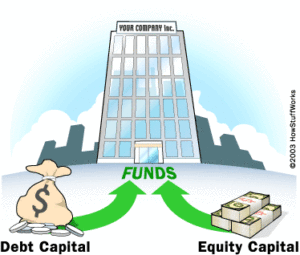When companies are in need of financing, the threshold question is whether the financing will take the form of equity or debt. Of course, there are hybrid forms such as convertible debt, and some financings will involve equity investment completed simultaneously with a bank loan. And sometimes debt will not be an available option, particularly for start-ups with no steady revenue that a lender could rely on for assurance of payment. But in many cases, a company will have a choice of which way to proceed.

A standard bit of advice you’ll hear is that equity is the most expensive form of financing, meaning you should opt for debt when you can get it. Here’s an example illustrating the point. A company needs $500,000 in financing and is valued at $5 million post-investment. The basic choice would be selling 10% of the equity in the company to raise those funds, or borrowing that amount from a bank. Suppose further that the company does well thereafter and is sold two years later for $15 million. The cost of the bank loan would be relatively modest – two years of accrued interest on the $500,000, which is tax-deductible. But for equity, the “cost” is a much higher $1.5 million – the value of the investor’s stake upon sale that would have otherwise gone to the founders.
However, this is a cherry-picked example that shows a stark difference, but it’s also a happy example for the founders because their equity increased in tandem with the investor’s. Suppose that instead of gangbusters success, the company’s sales declined sharply after the financing. As a result, if the company had obtained debt financing, it would find it difficult to meet the monthly payments, raising the risk of bankruptcy. But with the equity financing, involving no ongoing payment obligation to the investor (assuming it’s not preferred equity with cash dividends, which is more debt-like), the company has more time and freedom to weather the storm of the sales decline and potentially recover at a later date. So in this example, if debt triggers bankruptcy, it’s certainly the more “expensive” form of financing.
This doesn’t mean that I’m being a cheerleader for equity. If a company can obtain debt financing on reasonable terms and with some margin for error such that a downturn would not likely sink the company, by all means go for it. My only point is that one shouldn’t be wedded to an ideological, one-size-fits-all style approach when thinking about these issues.